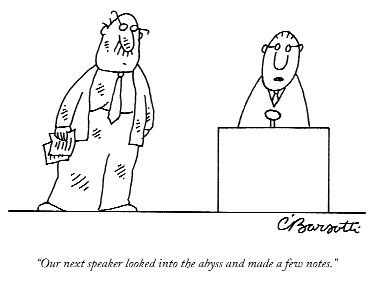Century Marks

Holy ground: An abbey in Pennsylvania welcomed a priest visiting from India and invited him to preside over mass. As he was about to utter the words of consecration (“This is my body. . . . This is my blood”), the priest took off his shoes. This simple act by someone from another culture helped the congregants recover a sense of wonder about the Eucharist (Robert J. Wicks, Prayerfulness, Sorin Books).
God’s advertising: When Old Testament scholar Ellen Davis was asked to lead a workshop on the book of Proverbs at a church in Beverly Hills, she was surprised to see how many people attended and were engaged by the topic. When she asked the audience where the energy was coming from, a woman replied: “Oh, most of us work in Hollywood. We write commercials and advertising copy. And when we were in training, they told us to read Proverbs.” It dawned on Davis that both Proverbs and advertising are trying to shape and stimulate desire. Where they differ is on the object of desire (Interpretation, July).
Contagious giving: Scott Harrison, 33, was a miserable nightclub promoter in Manhattan until he discovered charity work. His own organization, called “charity: water,” is only three years old, but already it has raised $10 million and has provided clean water to nearly 1 million people in Africa and Asia. He’s gotten commitments from 500 donors to cover administrative costs so that every penny from new donors goes directly to projects in the field. And he makes sure that donors get to see the impact of their donations. Naming rights to wells are granted, and global coordinates are given for projects so donors can view them on Google Earth (Nicholas D. Kristof, New York Times, July 12).
Feeding the hungry child: Charitable giving decreased to $308 billion (a 5.7 percent decline) in 2008 and is expected to drop even more this year. However, not all sectors suffered: funding is up 42 percent for Feeding America, a group that channels food and cash to food banks. “If you have to choose between giving to the ballet and feeding a hungry child, who’s going to win?” asks a spokesperson for the organization. A 100-point gain in the S&P 500 stock index increases charitable giving by $1.7 billion (Newsweek, July 20).
Birth control: College Bound Sisters is a program based at the University of North Carolina at Greensboro that pays girls ages 12 to 18 a dollar for every day that they don’t get pregnant. The goal is not just to prevent teen pregnancies but to encourage girls to graduate from high school and enroll in college (the money is earmarked for college tuition). The girls also meet in weekly classes in which abstinence is encouraged, and birth control is promoted for those who are sexually active. Of the students who stayed with the program, 5 percent got pregnant. A survey of girls with similar demographics found that the pregnancy rate was four times higher and enrollment in college half as likely (insidehighered.com, July 9).
Tending house: Thomas Lynch, a writer and undertaker, says that he was a single parent for a long time—something which, in the case of men, seems to turn them into feminists. Lynch often has to fill in the blank for “usual occupation” on death certificates. A surviving child or spouse will sometimes say of a deceased woman that she was “just a housewife.” Lynch says he thinks to himself, “You do it for a week and come back and tell me ‘just a.’ Because the effort to minimize the hardest work I’ve ever done was offensive. I can only imagine what it would mean to a woman who had done it all her life” (from Willow Springs, quoted at utne.com).
Called to journalism: Barbara Ehrenreich, giving the commencement address at the journalism school of the University of California at Berkeley, warned graduates that they are embarking on a career in a dying industry. Having started her journalism career as a single mother doing freelance writing, she hit the fat times of the 1990s when she was wined and dined by elite publishers in New York City. Now she’s back to lean times, having been offered one-fourth the pay she would have gotten five years ago for a series on what the recession is doing to the working class. Still, she challenged the graduates: “As long as there is a story to be told, an injustice to be exposed, a mystery to be solved, we will find a way to do it. A recession won’t stop us. A dying industry won’t stop us. Even poverty won’t stop us” (SFGate.com, May 31).
Religion brief: Stephen Prothero of Boston University is writing a book on world religions that will devote 30 pages to each. And recently he started using Twitter, the social networking tool that limits entries to 140 characters, to create short descriptions of each religion. He summarized Islam this way: “Allah told Gabriel told the prophet Muhammad (PBUH): Just 1 God, pray to Him 5x day, give alms, fast, hajj to Mecca. Submit! Ahh!” His take on Buddhism: “Path=let go(d).” And he even has an entry for atheism: “There is no uknowwho but Freud & Marx is his prophet” (Chronicle of Higher Education, June 12, and BU Today, June 23).
Did he or didn’t he? Stephen Harper, Canadian prime minister and a Protestant, has been criticized by a Catholic archbishop for accepting a communion wafer at a state funeral in a Catholic church. Some people at the service say it appeared as though Harper took the wafer from the priest but put it in his program or pocket, but Harper’s office said he consumed it. A spokesperson for the prime minister said, “Who is the prime minister to question a priest who offered him communion?” (UPI).





